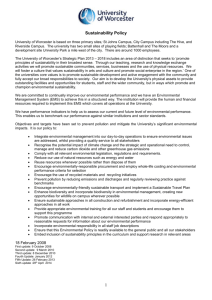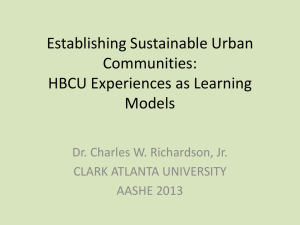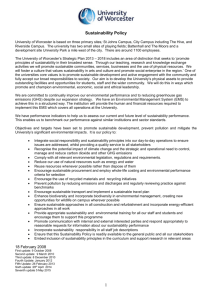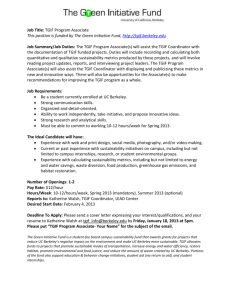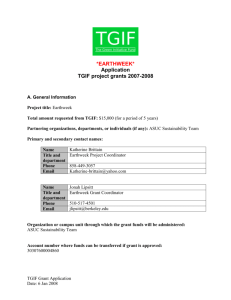The Center for Latin American Studies (CLAS) Carbon Smart and
advertisement
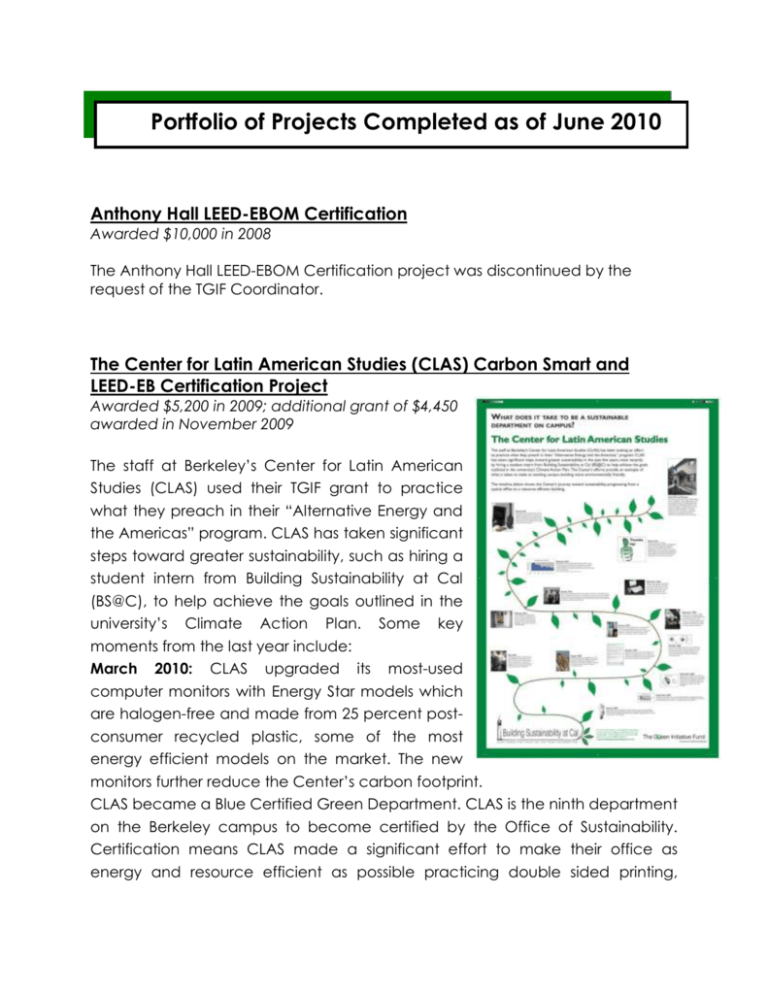
Portfolio of Projects Completed as of June 2010 Anthony Hall LEED-EBOM Certification Awarded $10,000 in 2008 The Anthony Hall LEED-EBOM Certification project was discontinued by the request of the TGIF Coordinator. The Center for Latin American Studies (CLAS) Carbon Smart and LEED-EB Certification Project Awarded $5,200 in 2009; additional grant of $4,450 awarded in November 2009 The staff at Berkeley’s Center for Latin American Studies (CLAS) used their TGIF grant to practice what they preach in their “Alternative Energy and the Americas” program. CLAS has taken significant steps toward greater sustainability, such as hiring a student intern from Building Sustainability at Cal (BS@C), to help achieve the goals outlined in the university’s Climate Action Plan. Some key moments from the last year include: March 2010: CLAS upgraded its most-used computer monitors with Energy Star models which are halogen-free and made from 25 percent postconsumer recycled plastic, some of the most energy efficient models on the market. The new monitors further reduce the Center’s carbon footprint. CLAS became a Blue Certified Green Department. CLAS is the ninth department on the Berkeley campus to become certified by the Office of Sustainability. Certification means CLAS made a significant effort to make their office as energy and resource efficient as possible practicing double sided printing, battery and ink toner recycling, and using reusable cups and plates among other actions. February 2010: As a result of eliminating unnecessary appliances and bottled water dispensers, practicing daylighting, and turning off computers, CLAS was able to reduce its electrical consumption rates by 30 percent when compared to the previous three years. January 2010: A private film screening and reception was certified as a Green Event by the Office of Sustainability. The function was catered by a local service which provides vegetarian options, alternatives to bottled water, compostable plates, paperless invitations, reusable nametags, and sustainable centerpieces. The Green Event shows the Center’s dedication to practicing sustainability outside the office. After months of educating staff members, researching alternatives, and testing water quality, CLAS canceled its contract for two five-gallon bottled water dispensers, thereby reducing its carbon footprint, promoting better health, and saving money. Project Lead: Beth Perry Program Coordinator, Center for Latin American Studies Earthweek 2010 Awarded $10,000 in 2008 ($2,000 per year from 2009-2014) Organized by the ASUC’s Sustainability Team (STeam), Earthweek 2010 (April 17th – 24th) was celebrated with a variety of events including concerts, art installations, and film screenings. STeam organized and coordinated with other student groups on campus to bring almost fifteen distinct events prior to and during the event. For instance, a publicity tour for the Disney movie Oceans came to UC Berkeley to screen the movie the day before the actual release and to help coordinate a concert with the Cold War Kids and an art installation with sea creates on Upper Sproul. Other more traditional Earthweek events such as the Strawberry Creek Clean-up and the Chancellor’s Advisory Committee on Sustainability (CACS) Summit were held as well. Next year the Earthweek committee hopes to build on the successes of this year’s event and continue to improve marketing efforts to create awareness in the campus community about sustainability. Project Leads: L. Jasmine Tuadi Mandy Jones Undergraduate Student Undergraduate Student No More Down the Drain Awarded $2,700 in 2009 This project is an effort by the ASUC Art studio to reduce the amount of scrap clay and excess glaze being washed down the drain and thrown away in the trash. TGIF funds were used to purchase two special closed-system recycling sinks, called “Cinks”, where students could wash dirty tools and have the glaze and waste clay captured. To help alleviate some of the need for additional time to manage the program, the Art Studio created an internship program to have some members work on the ceramics project in exchange for membership fees. Enough material has been captured to glaze over 3,500 coffee mugs and to make almost 1,000 clay coffee mugs. The Art Studio plans to continue refining the process for the clay recapture system as well as potentially working with other groups to supply flower pots created from recycled materials. Project Leads: Kate Wees Art Studio, ASUC Auxiliary Erik Scollon Talking Louder about Campus Sustainability Awarded $18,250 in 2009 Robby Abrams Expanding the culture of sustainability at UC Berkeley – a goal of the Office of Sustainability (Office) - requires improving access to information on a continuing basis, educating a broad range of community members, and empowering people to take positive action. With this in mind, the students and the Office embarked on a year-long intensive communications effort to talk louder about sustainability launched in June 2009 and implemented primarily by a team of student associates. This campaign differed from many other outreach campaigns nationwide in the effort reach out to non-traditional sustainability audiences, create more permanent solutions and partnerships, and raise the profile of UC Berkeley’s work. Some of varied tactics used during the Talking Louder Campaign included developing a comprehensive marketing-communications plan, redesigning the main campus sustainability website and companion sites, creating on-line and on-campus sustainability tours, offering twice per semester student sustainability forms, and increasing coverage, frequency, and readership of the Bright Green newsletter. Many of the efforts of this year’s Talking Louder about Sustainability campaign will be continued into the future – particularly those that were found to have the most impact and can be expanded to meet the demands of an ever increasingly sophisticated audience. Talking Louder about Campus Sustainability was one of the projects to present a poster at the 2010 CACS Summit. Project Leads: Kira Stoll Sustainability Specialist, Office of Sustainability Lisa McNeilly Director of Sustainability, Office of Sustainability Wurster Hall Composting Project Awarded $3,000 in 2009 This project was discontinued by request of the grantee due to significant rise in costs for the department to implement a composting program. Project Leads: Eli Perszyk Facilities Manager, College of Environmental Design Shirley Ferentinos Manager, Housing and Dining Services Updates on Continuing TGIF Projects 2009 Grant Awards Berkeley Student Food Collective Awarded $91,000 During the 2009-2010 academic year, the Berkeley Student Food Collective completed small goals on the road to its larger goal of establishing an oncampus food cooperative. The BSFC membership unanimously approved a motion to pursue a mobile kitchen and began selling sandwiches on Sproul Plaza every Monday, including tofu banh mi, black bean burgers, chickpea burgers, and red lentil patties. The Collective took out an insurance policy to cover the sales of food and the various events for which it will be providing food. Three members of our Board of Directors represented the BSFC at the Clinton Global Initiative University Conference in Miami. The External Affairs Committee of the Berkeley Student Co-operative voted to endorse a continuation of BSFC’s fiscal sponsorship agreement, while the BSFC continued to raise funds through a twelve-hour Dance-A-Thon. Project Leads: Alli Reed Undergraduate Student Christina Oatfield Undergraduate Student Betterbin Awarded $3,500 The Betterbin project set out to design space efficient recycling bins suitable for small dorm rooms and then eventually implement these “Betterbins” in all the dorm rooms at UC Berkeley. The goal for the 2009-2010 academic year was to manufacture ~100 bins for in-dorm testing and deliver a presentation to campus officials proposing the benefits of using the Betterbin in all dorm rooms. From RSEC feedback of the Betterbin prototypes, a final design was determined: 3 bins that are hooked together for stability, but can be detached for easy emptying. The bins include specialized tops to distinguish which bins are for what type of product. The bins are currently stored in Berkeley Institute of Design (BiD), on the second floor of Hearst Memorial Mining Building. The materials for building an actual bin have yet to be specified because the type of material will largely be influenced by the scale of manufacture. Betterbin has recently been struggling with a lack of motivation on its team and a lack of progress with getting the first 100 bins made. The next steps for the project include: Test the bin prototype in individual rooms to determine user acceptance of design Get approval to test Betterbins for an entire dorm building in order to acquire quantitative data for analysis Produce Betterbins and generate proper metrics for the test Collect data for 1 semester Analyze sustainability impact Propose adoption of Betterbins in all UC Berkeley dorm rooms Expand use of Betterbins to classrooms and other campuses Project Lead: Iris Jiang Undergraduate Student BicyCal Awarded $12,000 During the course of the Spring 2010 semester, BicyCal could be found twice-weekly at the North Gate and on Upper Sproul fixing bikes. The group provided both free maintenance and education for roughly 50-100 bicyclists. BicyCal’s greatest accomplishment was gaining access to a maintenance and educational HUB, to be located in the lower/upper Sproul breezeway. BicyCal will be setting up a home base for bicycle maintenance and education that will be open 2 days a week starting the Fall 2010 semester. BicyCal plans on submitting a reallocation for funds so it can put some of the grant money towards the space. BicyCal’s outreach and publicity has been conducted mainly through the repair days and its blog. BicyCal also distributed materials at the 2010 Bike-to-Work Day and to local bicycle shops. For project photos, please visit http://bicycal.com/. Project Leads: Austin Andrews Undergraduate Student Justin Wiley Undergraduate Student Lawns to Meadows Plan and Implementation Awarded $40,000 Over the course of the 2009-2010 academic year, all of the background work for the Lawns to Meadows Plan was completed. The team gathered campus input from a workshop held in January and researched campus costs on water, labor, and benchmarking. Four potential sites need to be whittled down to two, one of which could be the Anthony Hall front lawn. Other projects on campus are catching on and adopting the Lawns to Meadows approach. Clark Kerr has already added native plant designs into its LEED certified project and attempts are being made to add meadows or native plants into the Helios and Anna Head building projects. Project Leads: Jim Horner Campus Landscape Architect Theron Klos Operations Manager Recycling at Cal Program Awarded $55,000 The Recycling at Cal Team tabled during Earth Week and provided outreach and surveys related to its project and the culture of recycling at Cal. A new recycling bin design was approved by all stakeholders. A 3D mock up was built and placed on Sproul Plaza to assure the size was appropriate; it was. The team was finishing up the academic year by working on making shop drawings of the bins. After these drawings are complete, the team will have a campus welder make a prototype. The bins have received approval from the CRAB committee for meeting ADA standards. Project Leads: Michal Shuldman Graduate Student, Department of Integrative Biology Philippe Marchand Graduate Student Water Metering and Conservation Awarded $56,000 The Water Metering and Conservation team has completely handed off the building-scale water meter connections to Obvius and PPCS. The team members’ new task is to continue check-ups on the progress of the installations as they begin audits and submitting orders for the next phase (TGIF grant 2010) of their project. Regarding sub-metering and toilets in Wurster Hall, they have had the help of 4 civil engineering undergraduates with using the ultrasonic water meter to audit the water consumption of toilets in Wurster Hall. They need to collect some more data before deciding which fixtures to replace with the high efficiency toilets and urinals. By June, the team was nearing the end of discussions with PPCS to determine which sub-meters to order for fine-scale metering of Wurster Hall, and was working with an undergraduate electrical engineering student to set up the wireless sensor network for collecting and viewing data. Project Leads: Lindsay Miller Eliot Nahman 2008 Grant Awards Strawberry Creek Native Plant Nursery and Garden Awarded $12,865 During the week of May 10th, interviews were held with interested students to fill the position of Nursery Coordinator for the summer months; student David Pon was selected and he was formally hired. On May 11th and 12th 2010, irrigation plumbers from PP-CS Grounds, along with a backhoe operator from PP-CS Utilities, installed pipe chases for the irrigation service to both the nursery shadestructure as well as the demonstration native plants garden plot. SCNPN is now operational thanks to the PP-CS Irrigation crew getting water to the shade house. As of June 1, 2010, work yet to be completed included purchasing and installing flame resistant black shade cloth on the shade structure, installation of an automatic drip/mist irrigation system and a packed decomposed granite pathway, planting of border plants and specimen plants, and purchasing of worker and coordinator office cabinets. Project Leads: Tim Pine Karl Hans UC Berkeley Campus Dashboard Awarded $76,750 The permanent display panels for the FSM Café Interactive Install have been designed and re-designed based on user feedback, and a third effort is now under way. Wurster Hall’s install has been completed and has a touch screen for viewing current and past Wurster Hall energy and water usage. Unrealistic levels of technical complexity and inconsistent student labor have caused delays in the delivery of a smart, durable, and informative set of boards. Final signage design and interactive components are still in progress. Ongoing development, maintenance and redesign of website are being conducted by Sam Borgeson. Project Leads: Sam Borgeson PhD Student, Energy and Resources Group Omar Khan Graduate Student, Computer Science University Hall: Going Green! LEED-EBOM Awarded $10,000 Appliance Replacement: A total of 11 refrigerators were disposed of and replaced with 7 energy star model refrigerators based on the appliance audit conducted by Building Sustainability @ Cal during 2008-2009. In addition, the 3rd floor breakroom inefficient coffee maker and hotplate were replaced with an energy efficient model coffee maker and electric hot water kettle. Task Lighting: Approximately 300 task lights were purchased and distributed to building occupants. This resulted in increased enthusiasm in building occupants, and reduced usage of overhead lighting, which had energy saving and ergonomic benefits. The distribution of task lights fulfilled a LEED Credit for Existing Buildings, Operations & Maintenance Certification (IEQ credit 2.2). Window Film Pilot Project: This project is in the beginning phases. Two offices on the 3rd floor have been retrofitted with window film with good results. Feedback from the occupants suggested that the window film helped to reduce heat loading in the summer as well as glare from direct sun. This summer, the remaining offices on 3rd floor will be retrofitted with window film. Outreach / Education: Two “Green Coffee Hour” events have been held in the building, one each year since TGIF granted the building funding. The University Hall “Green Coffee Hour” has been an event where occupants can come and gather to discuss sustainability- both for in the office and at home- and enjoy a mid-afternoon snack and coffee. The event includes educational material showcases by vendors in the sustainable field) and campus groups which support sustainability. The University Hall Going Green! project has plans to complete the two outstanding project components (Outreach/Education and Window Film Pilot Project) by Fall, 2010. Pending results of the building commissioning, University Hall is planning on submitting documentation for LEED-EBOM certification by January, 2011. Project Leads: Rebecca Anderson Environmental Specialist, EH&S Janis Honda Public Health Ian Baldridge Radiation Safety Technician, EH&S

